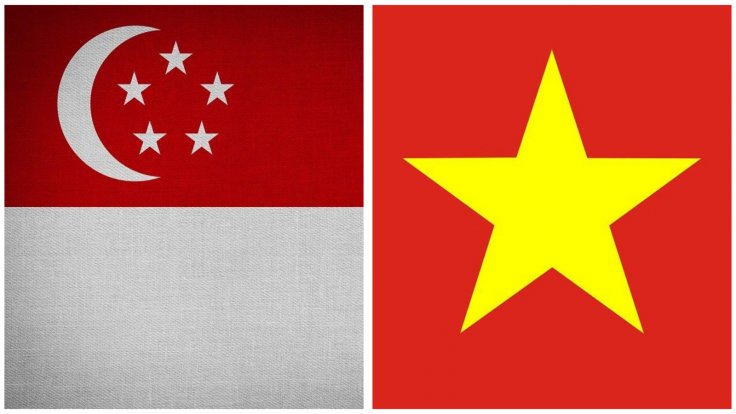
Prime Minister Lawrence Wong and his counterpart Pham Minh Chinh reaffirmed the close relations between Singapore and Vietnam by signing five agreements spanning industries like energy and financial services on Wednesday, March 26.
Wong and Chinh also broke ground for the new Vietnam-Singapore Industrial Park (VSIP) in Thai Binh province, the latest in a line of projects which Wong called "the cornerstone of our bilateral cooperation for almost three decades".
On the second day of his trip to Hanoi, Wong stated that there is a great deal of room for both nations to work together to achieve resilient and sustainable growth. He lay a wreath at the Ho Chi Minh Mausoleum earlier in the day.
At the Office of Government in the Vietnamese capital, both prime ministers watched five letters exchanged between officials on both sides.
They contained letters of intent to ease cross-border electricity commerce as part of the larger ASEAN power grid and to implement the previously announced Comprehensive Strategic Partnership (CSP).
Additionally, three memorandums of understanding (MOUs) were signed between the two parties on cross-border QR code payment, people-to-people exchange, and digital development and innovation.
Wong also noted the close economic cooperation between Singapore and Vietnam. He said, as quoted by CNA, "Last year, we were the largest foreign investor in Vietnam, with over US$10 billion in foreign direct investment," adding, "So before too long, we may become number one cumulatively too."
Wong outlined important bilateral activities, including talks on collaborating on carbon credits and bringing low-carbon energy into Singapore through renewable energy projects and undersea cable construction.
"We hope that these mutually beneficial collaborations will be able to advance in good time and have the support of Vietnam's central and local authorities," Wong added.
Wong and Chinh also saw the signing of four MOUs related to the VSIP project.
CNA quoted Wong as saying, "From the beginning, they have set the benchmark for industrial park development in Vietnam, providing international-standard infrastructure to investors, enabling them to operate seamlessly."
He went on to say that both parties may expand the project to include research and technology as well as urbanization, in addition to industrial parks.
Currently, Vietnam has 20 of these parks spread throughout 14 provinces. These have created 320,000 employment and attracted over US$23 billion of investment capital from over 1,000 tenant companies. Greener and smarter VSIPs will be constructed in the future, according to Wong.
He said, "They will incorporate technology and innovation to better manage energy, water, waste and traffic," adding, "This can lead to better efficiencies, better cost savings, and will also be better for the environment."
In addition, renewable energy will power the facilities. He gave the example of Lego, a toy firm whose Binh Duong III VSIP plant is powered by a local solar project and rooftop solar panels.
Wong stated, "I'm sure there will be many more to come, because companies everywhere want to decarbonise their supply chains and there is a great demand for green factories and green industrial parks."
The VSIPs will have improved connectivity in the future, he noted. For example, the new Thai Binh VSIP is "well-positioned to serve as a satellite industrial park" because a highway connects the Thai Binh province to Lach Huyen Port.
During his speech, Chinh praised Singapore's "significant investment" in Vietnam, particularly the VSIP program. According to him, the political and people-to-people connections between the two nations have produced real advantages, and Vietnam wants to increase the scope of the VSIP collaboration.
He said, "This VSIP model has been a great success which shall be elevated, thereby bringing the benefits to both our peoples," adding, "We shall continue to promote this model."









